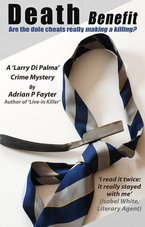|
My guest today is Adrian P Fayter. Adrian is a crime fiction writer, who has recently released his first book Death Benefit.  Ben: So firstly Adrian, congratulations on the publication of Death Benefit. I can honestly say it is the best self-published book I have read for some time. I'd call the book a crime thriller but it is a very different take from the standard cop drama. Can you tell us a bit about it? Adrian: Thanks, Ben, for your kind comments. I've been getting positive feedback from a wide variety of readers, and that’s a very encouraging thing for a writer. Death Benefit does follow certain crime writing conventions, but the protagonist/narrator, Larry Di Palma, works as a benefit fraud investigator. This allows me to create realistic investigation scenarios, but also means that Larry can stumble into danger in a believable way, because he doesn't have the same training or back-up team as a police detective. The book can be classed as a thriller, but it has a little less action than others in that genre. The atmosphere, characterisation and the cynical sense of humour of its narrator are all just as important to me. And there’s nothing less convincing than corpse after corpse appearing on the page...  Ben: So what made you want to write this style/genre. Are there any big influences that drew you in? Adrian: I’ve been writing for a very long time, and, as many of us do, I’ve experimented with poetry and short stories, and written an early, semi-autobiographical novel. Crime fiction is, broadly speaking, the biggest selling genre in the UK, so it made sense to consider moving in that direction with a view to getting published. But crucially, the result is a book written very much in my own voice, and saying things that I want to say. Readers may spot the influence of the earliest of Len Deighton’s spy novels in different aspects of the book; not least in the free gifts that come with purchases made directly from me or my website. Ben: Haha, yes indeed. So what is it about Len Deighton's novels that you like and is there any particular essence of them you've tried to capture in your own style? Adrian: His early books brilliantly describe the bureaucracy and office politics of espionage. They are also very funny and economical with their descriptions. I love the start of Billion Dollar Brain: ‘It was the morning of my hundredth birthday,’ is the perfect way to introduce the narrator’s hangover and the way he has let down his girlfriend the night before. The drab form-filling and the seedy locations such as the multi-storey car park in Death Benefit are there to create a sense of realism; locations and setting are important in the way a writer creates a mood or atmosphere. Ben: I was really impressed with the dialogue in your book and the characters as a whole. Larry Di Palma is a great character. It had me laughing out loud in a few places. Did you do any research or use any techniques to get these characters voices to come through so clear? Adrian: I remember in one of our MA classes we were talking about our characters, and I said that Larry had been with me for so many years that I couldn’t remember how he started out; however, he is basically me. And I think it’s true that a lot of his cynicism, and the conflict he feels between laziness and professionalism are present in my own character. Other readers have asked me about research I did in order to create a realistic setting and story. Well, years ago I worked in various roles in three different Jobcentres, and although I have altered some of the jargon and procedures, I think the result overall reflects nicely the bureaucratic world of benefit claims and benefit fraud. I’m pleased with the authenticity of the setting and characters, because any novel depends upon them, no matter whether literary or genre fiction.  Ben: Tell us a bit more about your MA and experience. Would you suggest this route for other budding writers? Adrian: The feedback from fellow students and tutors can be invaluable, but it has to come at the right time for each individual writer. I think I benefited immensely from doing the MA course at York St John University because I was able to fine-tune a completed novel as well as present some new experimental work. The key is to start a degree or MA course when you are going to benefit the most from a lot of constructive criticism. That could be as a mature, experienced writer or as a complete beginner: it depends on the individual. Ben: You self-published your book with Matador. Can you tell us a little about that? Adrian: I had strong interest from three different literary agents, but ultimately none of them was successful in taking the book into a publishing deal. However, I have since become a bit of a convert to the idea of self-publishing, which offers many potential advantages to any writer. Ben: Wow, that's great. So what are these advantages that made you go with self-publishing and do you have any top tips for people considering self-publishing? Adrian: My top tips for self-publishing can be seen on my website, but the most important one is probably this: ‘Don’t be in too much of a hurry, don’t set unrealistic deadlines, and always consider quality of product over speed of publication.’ The processes of publishing, marketing and selling inevitably take up as much time as writing itself. For example, despite the fact that my completed manuscript had been reviewed by different literary agents and by my university tutor, I still ended up doing four further proof reads before I was happy to go to press. I really hope readers haven’t spotted any more typos in the final product! As to advantages, well, if I sell a book directly from my website, book launch or other event, I keep 100% of the cover price. If a publisher sells via a bookshop, I get about 30%. Ben: So the book you've released mentions a sequel - can you tell us anymore about the next Larry Di Palma adventure? Adrian: The next novel, Live-in Killer, is currently in preparation – a taster is given at the end of Death Benefit in both its printed and e-book forms. Readers can also find a short story (with the promise of more to come) at the Rowntree Park Words from a Bench project. Ben: Thanks so much for your time Adrian and all the best with the next novel. Adrian: Thanks, Ben, and happy writing to you, too! You can find more writing and information about Adrian at:
Website: http://crimebooks.wordpress.com (Buy paperback copies here, and learn about crime writing, self-publishing and more) Amazon: http://www.amazon.co.uk/Death-Benefit-Adrian-P-Fayter/ (Buy paperback, download for Kindle and read reviews here)
0 Comments
|
AuthorBen Warden - Editor of the #SFFiction project and author of 'Life Without', which made the top ten literary fiction e-books on amazon. Categories
All
Blog Archive
January 2020
|

 RSS Feed
RSS Feed
